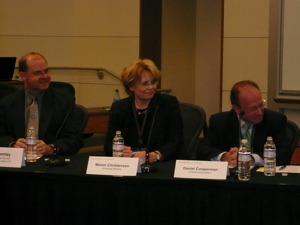Global legal challenges: General Counsel Forum, Stanford's E-Commerce Best Practices conference


There's a group of high profile in-house counsel and legal luminaries who participated today in the General Counsel forum at Stanford Law School's Fourth Annual E-Commerce Best Practices conference, including:
The session focused on legal issues related to doing business globally. My notes follow.
"Being a GE company has turned out to be a blessing in disguise, and if they ask you, tell them I said that." Maren Christensen, on having lots of resources to address developing legal issues as they arise.
MySQL's Smith, after Daniel Cooperman discussed Oracle now having a blogging policy: "I decided last week not to have a blogging policy." "It's more important to me to have a really good external communications policy. The same rules should apply. I try to lift it up in terms of generality."
Google's Kent Walker: "For us, we have a culture of innovation. At the same time, we have a very decentralized, participatory kind of company. It's out of that consensus that we try to get something. It's a process of evolution and pulling all the best ideas to the fore."
Question: what percolates up to the GC level, and on up to the CEO?
Kent Walker: We need to keep morale high and at the same time be responsive to clients. It tends to be somewhat reactive. 50% of our revenue is international and that creates a whole new class of problems. You find yourself drawn into problems that arise when, for example, you've managed to insult the King of Thailand.
Clint Smith: Using IP in our contracts to strike the appropriate balance is probably the most important thing we do.
Daniel Cooperman: It's quite important that you stay current and can anticipate the CEO's decisionmaking process. It's up to the GC to take the initiative to come forward and raise legal issues with the senior exec team concerning the things that are on their desks. Identifying experts both within and outside the company is important to getting projects done efficiently. In the area of keeping you up at night, the global nature of business ranks high. You can communicate policies, but not always be certain the policies will be communicated effectively and followed in the heat of the moment. General Counsel are also gatekeepers according to the SEC and are charged with getting the Board the information they need and making sure the Board is consulted regularly. The whole area of corporate governance has undergone a major change in the last 5-8 years; GC's now have potentially criminal exposure if they get it wrong.
Maren Christensen: "The three main things that keep me up are: piracy, piracy, and piracy." If we can't find ways to stem the tide, we are going to go the way that the record companies have gone, and other companies before us. Maren travels the globe regularly to address these issues.
Kent Walker: On the structural side, every time a company goes international there's an immediate tension. You need to have teams in those regions. Once you empower those folks, there's an immediate tension between the folks in the U.S. and the folks on the ground, in-country, who probably want to manage things in a slightly different way. Substantively, particularly on the Internet, we have a single global platform yet hundreds of different nations and thousands of different cultures all drinking out of the same pool. This feels like one of the most important things we're working on internationally.
Clint Smith: We have employees in more than 30 companies, and handling the IP, the options, the employee withholdings is quite a challenge for such a relatively small company.
Daniel Cooperman: "There are alot of things you can't do in France." Re implementing "whistleblower hotlines" as requires under Sarbanes-Oxley.
Maren Christensen: One of the greatest challenges of doing business globally is actually knowing what's going on in all the companies in which you do business. For me that means at least a weekly call with the senior lawyer in every country and for every one of the business lines. We've just started up a new business, a new international studio headquartered in London, which is going to be a lot of fun, but it's one of those things that you need to be sure is all done right. You need to be able to count on the people on the ground and in the trenches, and talk to them a lot.
Question from Mark Lemley about management style for an international business. It sounds like each country gets its own set of procedures?
Maren Christensen: "Particularly France." (Laughs.) Discusses DVD copying case Universal won in France. "We had a lot of good meals along the way..." (More laughs.) Discusses the fact they have and keep hiring local legal experts around the world.
Daniel Cooperman: points out that even jurisdictional differences within the U.S. complicate matters. Least common denominator approach is appropriate in many cases, but hard to apply in areas like privacy, where passions are high on all sides of the issue. Participants in this industry play a very active, a proactive role, in encouraging government officials to address jurisdictional disparities in the law.
Kent Walker: The EU has its own ideas about how long an Internet company must keep log data...this is the kind of thing that can wind up driving a global standard. We like to keep our employees out of jail (a real issue for both eBay and Google), and yet being a force that drives change. We've had issues with our hosting services (Blogger; YouTube) globally: Ghandi pole dancing in India; insulting the King of Thailand. Things that on their face may seem fine to us raise difficult, philosophical, cultural issues in other countries. We're working very diligently with courts and governments to figure out what all the right answers are here, but it's not always very clear.
Audience question re enforcing their company's code of business ethics and conduct:
Daniel Cooperman: We meet regularly to discuss the issues, we call them cases, that have come up under the code and the kind of punishments, disciplinary measures we're taking. You have to have a set of principles that guide the company globally. There are no set of principles that stop at a nation's border.
Kent Walker: When you try to roll that code out in Germany, France, etc., you may need to adjust the code around the margins.
Maren Christensen: Places like China can of course be a problem too. Our problem there (well, we have many problems there), is with manufacturers and licensees to make sure that we don't have child labor and other conduct that our code of conduct does not abide.
Daniel Cooperman: Some countries are extraordinarily corrupt, no matter how you look at it, and training people on your code of conduct, that this is not the way a U.S. company can do business, is very challenging.
Question from Michael Traynor about cases where injunctive relief has been the remedy.
Kent Walker: "Thank you Jay, wherever you are." (Jay Monahan, who is "singly responsible" for the eBay/MercExchange outcome in the Supreme Court.)
Daniel Cooperman: We're all delighted that the issue of mandatory injunctive relief in patent cases is off the table. We've got a ways to go, a number of major areas for patent reform.
Maren Christensen: We agree with that. You probably don't think of patents being our lifeblood, but with digital distribution they're increasingly important. Hats off to Jay.
Audience question re employee compliance with company legal policies.
Maren Christensen: discussed the importance of senior people actually showing up to emphasize the importance of training. I don't see this getting any better by the way.
Daniel Cooperman: There's a dizzying array of these policies, it's difficult for employees to absorb it all. Keeping it lighthearted and fun helps. Having an effective tone at the top is vital, emphasizing the importance of these policies, and making sure there are consequences for violations.
Kent Walker: All those disclaimers and warranties on your lawnmower don't actually make it safer.